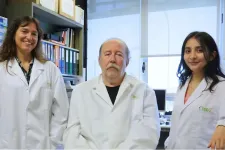(Press-News.org) A new study demonstrated parity between a minimally invasive procedure to replace the aortic valve in the heart—transcatheter aortic valve replacement (TAVR)—and surgical aortic valve replacement (SAVR).
In the meta-analysis of seven randomized trials, published in JSCAI and presented at the 2024 EuroPCR conference in Paris, France, researchers compared the outcomes of 7,785 patients undergoing TAVR (a procedure that delivers a new aortic valve into the heart through a catheter) to those undergoing SAVR for severe aortic stenosis. The study found no significant difference in death or disabling stroke between TAVR and SAVR patients (HR 1.02, 95% CI 0.93–1.11, p=0.70) with similar long-term mortality risks.
“This study represents the largest scale analysis so far available comparing longer-term percutaneous devices for aortic valve replacement versus surgery,” said study coauthor Eliano Pio Navarese, MD, PhD, head of clinical experimental cardiology and associate professor at the University of Sassari in Italy. “Our findings support the comparable long-term safety and efficacy of TAVR, as well as raise important considerations for valve type selection, particularly when we are dealing with longer-term valve durability and pacemaker implantation.”
The results were consistent across different surgical risk profiles (low, intermediate, and high). Compared with SAVR, TAVR was associated with an increased likelihood of needing a pacemaker and moderate-to-severe paravalvular leaks.
Notably, on a prespecified analysis, the study addressed the outcomes of two distinct TAVR devices versus SAVR. Compared with SAVR, self-expanding TAVR prostheses demonstrated lower death or stroke risk (P=0.06), valve thrombosis (P= 0.06), and valve gradients (P<0.01) but higher pacemaker implantation rates (P < 0.01) than balloon-expandable TAVR, highlighting potential long-term differences between the two percutaneous TAVR devices.
[ARTICLE LINK to go live at embargo lift: https://doi.org/10.1016/j.jscai.2024.102143]
###
About Society for Cardiovascular Angiography & Interventions (SCAI)
The Society for Cardiovascular Angiography & Interventions, established in 1978, stands as the primary nonprofit medical society dedicated to representing invasive and interventional cardiology. SCAI's mission is to guide the global interventional cardiovascular community by fostering education, advocacy, research, and upholding standards for quality patient care. For more than 40 years, SCAI has exemplified professional excellence and innovation worldwide, cultivating a reputable community of over 4,500 members committed to advancing medical science and providing life-saving care for individuals, both adults and children, affected by cardiovascular disease. For more information, visit https://scai.org/.
END
Transcatheter valve replacement outcomes similar to surgery
Largest scale analysis comparing longer-term percutaneous devices for aortic valve replacement versus surgery
2024-05-15
ELSE PRESS RELEASES FROM THIS DATE:
Germline regulation and sex differences: How they impact lifespan in vertebrates
2024-05-15
The study revealed unexpected and sex-specific effects of germline regulation on longevity and somatic repair in vertebrates. Contrary to classical evolutionary theories, it turns out that changing how the germline (the part responsible for reproduction) works can have different effects on males and females. This challenges conventional beliefs that reproduction and longevity are linked by a limited pool of resources. The research opens up new possibilities for understanding how our bodies age and the role of reproduction in that process. The findings ...
Detection of an Earth-sized exoplanet orbiting the ultracool dwarf star SPECULOOS-3
2024-05-15
The SPECULOOS project, led by the astronomer Michaël Gillon from the University of Liège, has just discovered a new Earth-sized exoplanet around SPECULOOS-3, an "ultracool dwarf" star as small as Jupiter, twice as cold as our Sun, and located 55 light-years from Earth. After the famous TRAPPIST-1, SPECULOOS 3 is the second planetary system discovered around this type of star.
Ultra-cool dwarf stars are the least massive stars in our Universe, similar in size to Jupiter, more than twice as cold, ten times less massive and a hundred times less ...
Scientists discover blood proteins that may give cancer warning 7 years before diagnosis
2024-05-15
Two Cancer Research UK-funded studies from Oxford Population Health have discovered proteins in the blood that could warn people of cancer more than seven years before it is diagnosed.
Scientists identified 618 proteins linked to 19 different types of cancer, including 107 proteins in a group of people who blood was collected at least seven years before diagnosis.
The team have discovered that these proteins could be involved at the very earliest stages of cancer, where it could be prevented.
They ...
Astronomers discover new Earth-sized world orbiting an ultra-cool star
2024-05-15
A new, Earth-sized planet orbiting an ultra-cool red dwarf star, has been detected by an international team of astronomers – just 55 light years away.
The planet is only the second of its kind to be discovered around this type of star. Called SPECULOOS-3 b, it takes around 17 hours to complete an orbit of the star which is more than twice as cold as our sun, as well as ten times less massive and a hundred times less luminous.
Days and nights on SPECULOOS-3 b seem to be endless: the planet is likely to be tidally locked, so the same side – the ‘dayside’ – always faces the star in a relationship similar to our moon and Earth.
The ...
New biomarker to diagnose Alzheimer's in asymptomatic stages
2024-05-15
A recent study led by the Molecular and Cellular Neurobiotechnology group at the Institute for Bioengineering of Catalonia (IBEC) and the University of Barcelona has identified a new biomarker for Alzheimer's disease in asymptomatic stages of the disease. The molecule is miR-519a-3p, a microRNA directly linked to the expression of the cellular prion protein (PrPC), which is deregulated in people suffering from some neurodegenerative diseases such as Alzheimer's.
The search for biomarkers that are stable and easily detectable in biofluids, ...
Research sheds light on how proteins linked to Alzheimer’s disease influence neuronal growth
2024-05-15
New research has shed light in the complex interplay between cell proteins, and how they impact on neurons in neurodevelopmental disorders and Alzheimer’s disease.
A new study led by the University of Exeter and published in Royal Society Open Biology has discovered the key role that the protein Contactin-4 (encoded by the gene CNTN4) plays in shaping neurons.
The researchers began studying CNTN4 because it was known to have a role in autism, but its functional roles were not well understood. The team explored how CNTN4 functions within the brain, particularly its interactions with proteins involved in neurodegenerative diseases like Alzheimer's ...
Early retirement of old vehicles won't save the planet: A study
2024-05-15
Lifespan caps for passenger vehicles have limited effect on reducing greenhouse gas emissions and could drive up costs and material use finds a new study published in Environmental Research: Infrastructure and Sustainability. The research shows that although Light-Duty vehicles (LDVs) contribute 17% to the annual greenhouse gas emissions in the United States, imposing a 15-year lifespan cap on LDV fleets under a business-as-usual scenario will not lead to any meaningful reductions in GHG emissions.
To combat delayed uptake of Electric Vehicles (EVs), some have argued for limits on the vehicle’s ...
EuroPCR 2024 – Short-term data from NOTION-2: TAVR versus SAVI for younger patients with aortic stenosis
2024-05-15
Paris, France, 14-17 May 2024. The Course Directors have selected 3 major Late Breaking Trials (LBTs) that will be presented for the first time during the 2024 edition of EuroPCR. These trials were selected on account of their design, outcomes and potential to influence daily clinical practice. Among them is the NOTION-2 randomised clinical trial (RCT).
Background
Evidence comparing the use of transcatheter aortic valve implantation (TAVI) and surgical aortic valve replacement (SAVR) in low-risk patients with aortic ...
EuroPCR 2024 – One-month DAPT followed by 5-month Ticagrelor monotherapy in acute coronary syndromes with DCB - results from REC-CAGEFREE II
2024-05-15
Paris, France, 14-17 May 2024. The Course Directors have selected 3 major Late Breaking Trials (LBTs) that will be presented for the first time during the 2024 edition of EuroPCR. These trials were selected on account of their design, outcomes and potential to influence daily clinical practice. Among them is the REC-CAGEFREE II trial.
Background and methods
The REC-CAGEFREE II trial is an open-label, investigator-initiated, non-inferiority, multicentre randomised trial comparing stepwise de-escalation of dual antiplatelet therapy (DAPT) with standard DAPT in patients with acute coronary syndrome (ACS) treated with paclitaxel-coated balloons (PCB). Eligible ...
EuroPCR 2024 – Early outcomes of a randomised non-inferiority trial comparing TAVI devices: the LANDMARK trial
2024-05-15
Paris, France, 14-17 May 2024. The Course Directors have selected 3 major Late Breaking Trials (LBTs) that will be presented for the first time during the 2024 edition of EuroPCR. These trials were selected on account of their design, outcomes and potential to influence daily clinical practice. Among them is the LANDMARK trial.
Background and Methods
Key randomized controlled trials have compared surgical aortic valve replacement (SAVR) with transcatheter aortic valve implantation (TAVI) using one of two commercially available transcatheter heart valves (THVs) - ...
LAST 30 PRESS RELEASES:
Bug beats: caterpillars use complex rhythms to communicate with ants
High-risk patients account for 80% of post-surgery deaths
Celebrity dolphin of Venice doesn’t need special protection – except from humans
Tulane study reveals key differences in long-term brain effects of COVID-19 and flu
The long standing commercialization challenge of lithium batteries, often called the dream battery, has been solved.
New method to remove toxic PFAS chemicals from water
The nanozymes hypothesis of the origin of life (on Earth) proposed
Microalgae-derived biochar enables fast, low-cost detection of hydrogen peroxide
Researchers highlight promise of biochar composites for sustainable 3D printing
Machine learning helps design low-cost biochar to fight phosphorus pollution in lakes
Urine tests confirm alcohol consumption in wild African chimpanzees
Barshop Institute to receive up to $38 million from ARPA-H, anchoring UT San Antonio as a national leader in aging and healthy longevity science
Anion-cation synergistic additives solve the "performance triangle" problem in zinc-iodine batteries
Ancient diets reveal surprising survival strategies in prehistoric Poland
Pre-pregnancy parental overweight/obesity linked to next generation’s heightened fatty liver disease risk
Obstructive sleep apnoea may cost UK + US economies billions in lost productivity
Guidelines set new playbook for pediatric clinical trial reporting
Adolescent cannabis use may follow the same pattern as alcohol use
Lifespan-extending treatments increase variation in age at time of death
From ancient myths to ‘Indo-manga’: Artists in the Global South are reframing the comic
Putting some ‘muscle’ into material design
House fires release harmful compounds into the air
Novel structural insights into Phytophthora effectors challenge long-held assumptions in plant pathology
Q&A: Researchers discuss potential solutions for the feedback loop affecting scientific publishing
A new ecological model highlights how fluctuating environments push microbes to work together
Chapman University researcher warns of structural risks at Grand Renaissance Dam putting property and lives in danger
Courtship is complicated, even in fruit flies
Columbia announces ARPA-H contract to advance science of healthy aging
New NYUAD study reveals hidden stress facing coral reef fish in the Arabian Gulf
36 months later: Distance learning in the wake of COVID-19
[Press-News.org] Transcatheter valve replacement outcomes similar to surgeryLargest scale analysis comparing longer-term percutaneous devices for aortic valve replacement versus surgery



